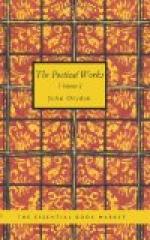When kings are forced to sell, or crowds to buy.
Indulge one labour more, my weary muse,
For Amiel: who can Amiel’s praise refuse?
Of ancient race by birth, but nobler yet 900
In his own worth, and without title great:
The Sanhedrim long time as chief he ruled,
Their reason guided, and their passion cool’d:
So dexterous was he in the crown’s defence,
So form’d to speak a loyal nation’s sense,
That, as their band was Israel’s tribes in small,
So fit was he to represent them all.
Now rasher charioteers the seat ascend,
Whose loose careers his steady skill commend:
They, like the unequal ruler of the day,[72] 910
Misguide the seasons, and mistake the way;
While he withdrawn, at their mad labours smiles,
And safe enjoys the sabbath of his toils.
These were the chief, a small but
faithful band
Of worthies, in the breach who dared to
stand,
And tempt the united fury of the land:
With grief they view’d such powerful
engines bent,
To batter down the lawful government.
A numerous faction, with pretended frights,
In Sanhedrims to plume the regal rights;
920
The true successor from the court removed;
The plot, by hireling witnesses, improved.
These ills they saw, and, as their duty
bound,
They show’d the King the danger
of the wound;
That no concessions from the throne would
please,
But lenitives fomented the disease:
That Absalom, ambitious of the crown,
Was made the lure to draw the people down:
That false Achitophel’s pernicious
hate
Had turn’d the Plot to ruin church
and state: 930
The council violent, the rabble worse:
That Shimei taught Jerusalem to curse.
With all these loads of injuries
oppress’d,
And long revolving in his careful breast
The event of things, at last his patience
tired,
Thus, from his royal throne, by Heaven
inspired,
The god-like David spoke; with awful fear,
His train their Maker in their master
hear.
Thus long have I, by native mercy
sway’d,
My wrongs dissembled, my revenge delay’d:
940
So willing to forgive the offending age;
So much the father did the king assuage.
But now so far my clemency they slight,
The offenders question my forgiving right:
That one was made for many, they contend;
But ’tis to rule; for that’s
a monarch’s end.
They call my tenderness of blood, my fear:
Though manly tempers can the longest bear.
Yet, since they will divert my native
course,
’Tis time to show I am not good
by force. 950
Those heap’d affronts that haughty
subjects bring,
Are burdens for a camel, not a king.
Kings are the public pillars of the state,




